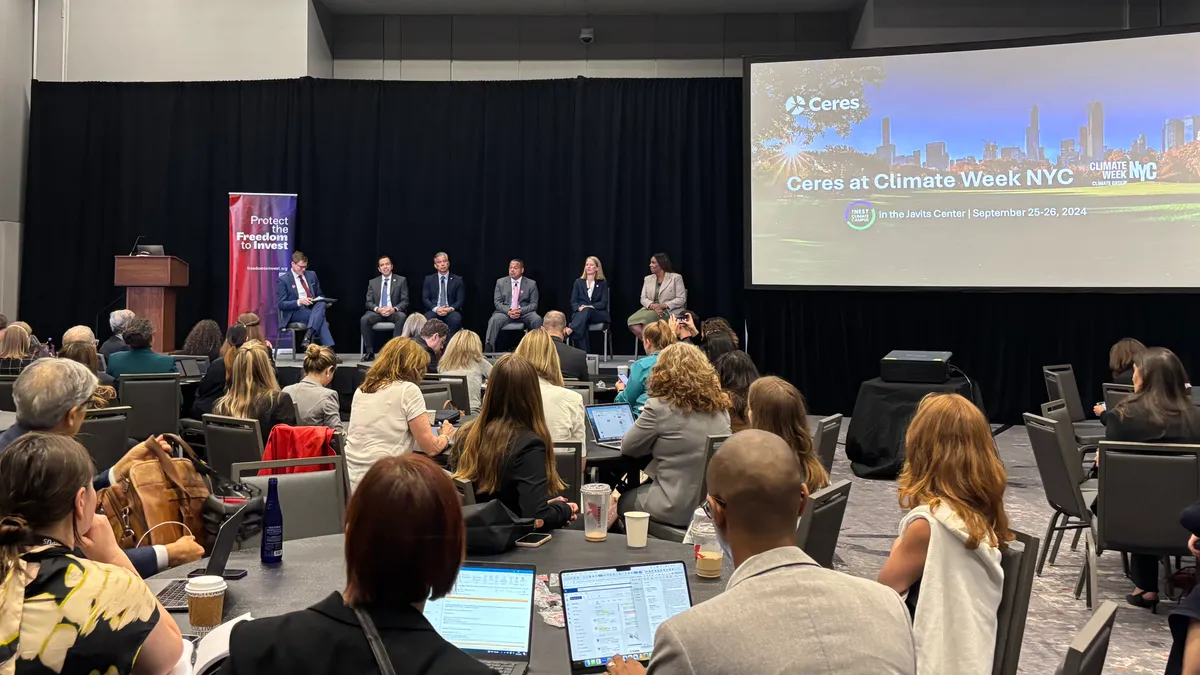When it comes to the messaging around the term “ESG” and environmental, social and governance factors more broadly, Republican officials and lawmakers have largely dominated the framing of the conversation. However, in the past year, state attorneys general from the other side of the aisle have begun speaking out on the topic.
A coalition of Democratic state AGs emerged last December to express support for the Department of Labor’s rule allowing fiduciaries to use ESG factors as a tiebreaker — a rule which is still facing a legal challenge. This year, a similar alliance of blue state AGs signed on as intervenors to help defend the Securities and Exchange Commission’s climate-risk disclosure rule from lawsuits, with California filing an amicus, or friend of the court, brief.
As the political rhetoric picked up, Arizona AG Kris Mayes and her fellow Democratic state AGs felt increasing pressure to protect the concept, she said at a Sept. 25 panel hosted by Ceres during Climate Week NYC.
“We were on the verge of losing this messaging battle by allowing [Republicans] to declare that ESG is ‘woke’ or … that they're trying to prevent something bad from happening,” Mayes said. “They are impeding on the freedom of corporate America to invest in clean energy technologies and sustainability in a way that resounds to the benefits of not only their shareholders, but also their customers.”
Over the past few years, legislators in Congress and statehouses have looked to outlaw or restrict the use of ESG factors, while state Republican attorneys general have focused their efforts on working to block ESG-related and adjacent regulations. A coalition of 26 Republican state AGs are part of the challenge to the Labor Department’s tiebreaker standard. A similar coalition of red state attorneys general lined up to file challenges to the SEC’s climate-risk disclosure rule, which has been stayed during the litigation.
Mayes said her fellow Democrat AGs picked up their pro-ESG messaging to counter the Republican Attorneys General Association, which she and others accused of looking to “bully” corporations into dropping ESG-related initiatives.
“It’s not business as usual anymore; climate change has an impact on your business,” California AG Rob Bonta said. “We're pushing back because the Republicans are rewriting reality, trying to voice the false narrative on business … and we can’t stand for that.”
“I worry that if their bullying tactics work, it might dissuade [companies] from doing things that are in the best interest of your company, which will … disadvantage everyone,” Minnesota AG Keith Ellison echoed. “So we've got to make sure that [companies are] free to make the calls that you're supposed to make.”
There are currently 43 anti-ESG laws that have been enacted in 21 states across the country, according to a live tracker by Pleiades Strategy. Among them are regulations prohibiting the use of ESG factors by state investment fund managers or establishing a state blacklist of firms banned from working with the state over their perceived stances on ESG, fossil fuels and other topics.
“All that we are asking is that ESG factors be considered with regards to your investment decision, and that you be informed,” Letitia James, attorney general for New York, said at the panel. “It's important that individuals understand that integrating ESG factors in your investment decisions is not a trend [and] is more than just a values-based decision. It's really about your bottom line.”
Matthew Platkin, New Jersey’s attorney general, said that when it comes to incorporating ESG factors into investment decisions “we’re not talking about charity here.” Studies of anti-ESG laws in Texas, Oklahoma and other localities have found restrictive anti-ESG laws to increase costs for municipalities. Anti-ESG rules in Missouri and Oklahoma have been struck down this summer. Additionally, a lawsuit was filed against the state of Texas for one of its anti-ESG laws in late August.
“If you're going to sit here and talk about the long-term or even the short- or medium-term economic realities, then you have to incorporate the impact of climate change,” Platkin said.
Republicans in the House of Representatives recently passed a pair of anti-ESG laws that have a near-zero chance of becoming law during the current congress, with Democrats in control of the Senate. Ellison said even if these bills are ultimately killed as expected, the process of being called into committee is a timely ordeal, and if the bills are ever signed into law, “you can bet we’re going to sue to invalidate them.”
“You should have a full line of sight on all the material information that is available to you; you should not be deprived of any of it,” Bonta added. “You should not be forced to run your business or make your investment decisions with an arm behind your back or a blind eye, and that's literally what [Republicans] are — through law and through mandate — seeking to do.”


















